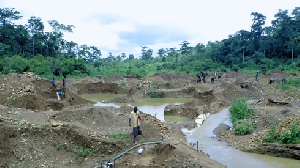 The CSOs say the project poses possible health risks and threats for Ghanaians
The CSOs say the project poses possible health risks and threats for Ghanaians
Sixty-five civil society organizations (CSOs) globally, have kicked against plans by China to embark on an intended bauxite development in Ghana’s forests, citing social and environmental risks.
The number includes 37 CSOs in Ghana, 11 from Africa and 17 of them operating outside the African continent.
An agreement, already signed between Ghana and China for the Chinese government to support bauxite development in Ghana, is funded by the Chinese Development Bank at US$10 billion, with the project’s key developerbeing, the China Railway Engineering Corporation.
The CSOs, in a statement, indicated that China Development Bank’s signing of the UN Global Compact, and its membership of the United Nations Environment Programme’s (UNEP) Finance Initiative, both of which are designed to ensure that signatories take a precautionary approach to development projects, which could have probable negative impacts on the environment and people, especially affected communities, is being compromised by the bank.
Signatories to that agreement are also expected to commit to best environmental management practices, risk assessments and management, and the integration of social and environmental considerations in all operations and decisions.
The statement explained that China Development Bank’s 2015 Sustainability Report is also positive, including an objective to “dedicate to green development and promote ecological civilization”, including environmental protection.
The report indicated, “we are also aware that the China Development Bank is regulated by the China Banking Regulatory Commission and its mandatory ‘Green Credit Directive’, which obligates all China’s banks to ensure that, projects they finance abide by applicable laws and regulations on environmental protection, land, health and safety of the country or jurisdiction where the project is located, and consistent with international best practices and standards.
The 65 organizations, said, “it is therefore deeply worrying, that after all these good intentions by China, that country went ahead to sign an MoU for a project which poses possible health risks and threats for Ghanaians in general and the environment as a whole.
The bauxite development MoU identifies the Kibi and Nyinahin bauxite deposits under the Atewa and Tano Offin forest reserve.
The Atewa Forest, one of Ghana’s last remaining intact forests, is an area of unique and very complex ecosystems with rich combinations of species found nowhere else on Earth.
The Tano Offin Forest Reserve, Ghana’s fourth largest Globally Significant Biodiversity Area, contains similarly important biodiversity and species richness.
Besides the huge biodiversity value of these two forests, there is also their crucial role in water provision for Ghanaians. The headwaters of the River Offin, a protected area because of the ecosystem services it provides, are in the Tano Offin Forest Reserve and would be threatened as a source of clean water if bauxite mining were to take place there.
“A cost-benefit analysis of alternative uses of the Atewa Forest found that conserving the forest intact and creating a National Park at Atewa with a supporting buffer zone would result in a cumulative value of US$ 11.57billion over 30 years compared to the US$ 10.17 billion brought by mining and logging activities.